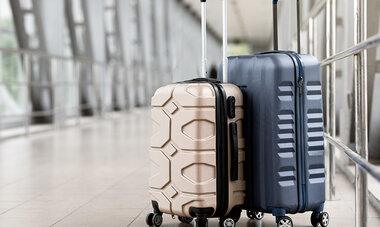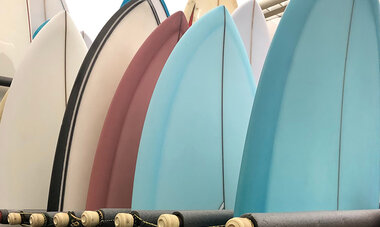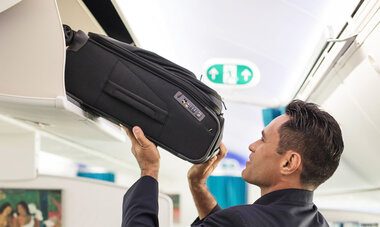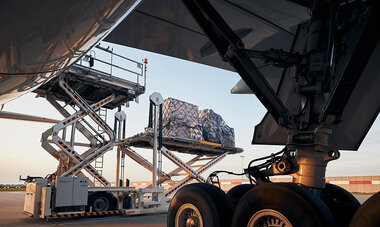
Restricted or prohibited items
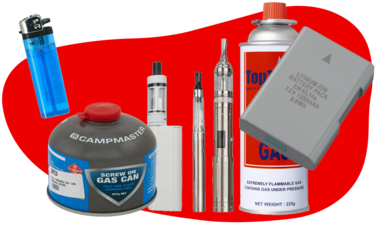
Some items are permitted but have restrictions for transport :
- Prohibited in checked luggage and/or in carry-on luggage
- Prior approval from the airline is required
- Restrictions on quantities
- Transport conditions (packaging, etc.)
TRANSPORT CONDITIONS
- Lithium batteries with a power rating not exceeding 100 Wh :
Twenty (20) batteries maximum permitted in carry-on luggage
- Lithium batteries with a power rating exceeding 100 Wh but not exceeding 160 Wh :
Two (2) batteries maximum permitted in carry-on luggage
Caution : The airline’s prior approval is required
- Lithium batteries with a power rating exceeding 160 Wh :
PROHIBITED IN CARRY-ON LUGGAGE AND CHECKED LUGGAGE
The batteries shall be individually protected :
In the original retail packaging
In a plastic bag
In a dedicated case
Covering the exposed terminals with adhesive tape
TRANSPORT CONDITIONS
Transport conditions for external batteries and powerbanks are the same as spare lithium batteries.
Imporant:
External batteries (powerbanks) must remain under passenger supervision throughout the flight. They must not be used or charged during the flight.
Our teams may carry out checks during check-in to ensure that transport conditions are met.
TRANSPORT CONDITIONS
- The device shall be :
-Switched off
-Individually placed in a protective case to prevent any accidental activation. This case shall be placed in carry-on luggage
- The use and charge of e-cigarette during flight is prohibited
Examples :
- For cameras
- For cell phones
- For portable computers
- For camcorder
TRANSPORT CONDITIONS
It shall be :
-Transported by a representative of a government weather bureau or similar official agency-Packed in a strong outer packaging, having a sealed inner liner ; or
-Packed in a bag of strong leak-proof and puncture-resistant material impervious to mercury, which will prevent the escape of mercury from the package irrespective of its position.
Caution : The airline’s prior approval is required
- The battery power rating must be 160 watthours or less
- The battery must be removable
- If the baggage is to be checked in, the battery must be removed and transported in carry-on baggage
Any removed battery placed in carry-on baggage must :
- Be protected from short circuit, insulating and covering the terminals
- Be protected from damage, source of heat or from being smashing
- Be kept away from any flammable substance or article (aerosols, alcohols, etc.)
TRANSPORT CONDITIONS
- The battery shall be either :
-Adequately protected against damage by the design of the mobility aid and securely attached to the wheelchair. The electrical circuits must be isolated following the manufacturer’s instructions ;
OR
-Removed from the mobility aid following the manufa cturer’s instructions.
- The removed battery must not exceed 300 Wh. If the mobility aid is powered with two batteries, each battery must not exceed 160 Wh. In addition, a passenger may carry a maximum of one spare lithium ion battery with a power rating not exceeding 300 Wh or a maximum of two spare batteries, each battery must not exceed 160 Wh.
- Any removed battery(ies) and any spare battery(ies) shall be placed in carry-on luggage. Battery terminals shall be protected from short circuits, e.g. by being enclosed within a battery container
- The wheelchair shall be transported as checked luggage
Caution : The airline’s prior approval is required
TRANSPORT CONDITIONS
- The battery terminals shall be protected from short circuits, e.g. by being enclosed within a battery container
- The battery(ies) shall be either :
-Adequately protected against damage by the design of the mobility aid and securely attached to the wheelchair. The electrical circuits must be isolated following the manufacturer’s instructions ; or
-Removed from the mobility aid following the manufacturer’s instructions.
- A passenger may carry a maximum of :
-One spare wet, non-spillable battery ; or
-Two spare nickel metal hydride batteries ; or
-Two spare dry batteries
- The removed batteries and spare batteries shall be carried in strong, rigid packagings
- The wheelchair shall be transported as checked luggage.
Caution : The airline’s prior approval is required
TRANSPORT CONDITIONS
- The battery terminals shall be protected from short circuits, e.g. by being enclosed within a battery container
- The battery(ies) is fitted, where feasible, with spill-resistant vent caps
- The battery shall be either :
-Adequately protected against damage by the design of the mobility aid and securely attached to the wheelchair. The electrical circuits must be isolated following the manufacturer’s instructions
-Removed from the mobility aid following the manufa cturer’s instructions when the mobility aid cannot be maintained in an upright position.
- The wheelchair shall be transported as checked luggage.
Caution : The airline’s prior approval is required
The transportation of firearms as sports or hunting equiment is permitted under the conditions outlined on our Sports equipment and other special baggage page.
Caution : The airline’s prior approval is required
Examples :
- Camping stoves
- Blower
- High pressure cleaner / washer
- Lawnmower
- Brushcutter
- Chainsaw
TRANSPORT CONDITIONS
Camping stove and/or fuel container shall be completely drained of all liquid fuel. Measures shall be taken to nullify the danger : drainage, cleaning, flushing, suppression of any residual hazard (smell, vapors, etc.)
Caution : The airline’s prior approval is required
Exemples :
Dispositifs utilisés pour l’étalonnage des dispositifs de contrôle de la qualité de l’air
Caution : The airline’s prior approval is required
TRANSPORT CONDITIONS
- The fuel tank of the vehicle, machine or other apparatus has never contained any fuel, or the fuel tank has been flushed and purged of vapours and adequate measures taken to nullify the hazard.
- The passenger shall provide the airline with written or electronic documentation stating that a flushing and purging procedure has been followed.
- The entire fuel system of the engine has no free liquid and all fuel lines are sealed or capped or securely connected to the machinery or apparatus.
Caution : The airline’s prior approval is required
TRANSPORT CONDITIONS
- Ammunition shall be securely packed
- Transported in quantities not exceeding 5 kg gross weight per person
- Allowances of more than one person must not be combined into one or more packages
Examples:
- Hypodermic needles, cattle needle, sewing needle, darts
- Corkscrew, ice pick, skewers, scissors
- Syringes
- Pins, screws, screwdriver, chisel
- Shuriken, Okinawa hairpins , martial art suplies
- Tent stakes
- Crampons
- Ice axe
Examples:
- Scissors, cutter
- Swiss knife, cigar cutter, corkscrew with blade
- Sword, saber, dagger
- Knife, scalpel, razor blade
- Hatchet, axe, saw, drill
- Martial art supplies, parapluie samourai, shuriken
- Boomerang
- Hammer, crowbar, pliers, pry bar
- Skateboard, snowboard
- Electric guitar
- Hand tools, monkey wrench
- Ice skates, skis,
- Golf club
- Baseball bat, softball bat, cricket bat, paddles, fishing rod
- Hiking sticks, ski poles, hockey sticks, walking sticks, pilgrim sticks, massage sticks, cricket poles, pool cue
- Martial arts supplies
- Tripods, flag bearer
- Croquet mallets
- Cast iron stove
- Truncheon
- Metal detector
- Brass knuckles
Examples :
- Sander
- Screwdriver
- Drill
- Hedge trimmer
- Blower
- Lawnmower
- Chainsaw
- Brushcutter
- Nailer
- Etc.
TRANSPORT CONDITIONS
- The battery shall be removed from the device and placed in carry-on luggage
- The terminals shall be protected from short circuits e.g. by being enclosed within a battery container
- The device, without its battery, shall be carried in checked luggage
TRANSPORT CONDITIONS
One (1) medical or clinical thermometer containing mercury per person, when in its protective case.
Including medical devices
Examples :
- Portable oxygen concentrator
- Camera
- Mobile phone
- Portable computer
- Gaming console
- Tablet
TRANSPORT CONDITIONS
- Lithium metal powered electronic devices
The content of lithium metal shall not exceed 2 g
- Lithium ion powered electronic devices
The power rating shall not exceed 100 Wh
- When placed in the checked luggage, electronic devices shall be switched off and protected from damage
- A passenger may carry up to 15 electronic devices
Caution : If you are travelling to the United States, please make sure all your electronic devices are sufficiently charged. The Airport Security may control their functionality. In case of malfunction, your devices may be confiscated.
Including medical devices
TRANSPORT CONDITIONS
- Lithium metal powered electronic devices
The content of lithium metal shall be over 2g but not exceeding 8 g
- Lithium ion powered electronic devices
The power rating shall be over 100 Wh but not exceeding 160 Wh
When placed in the checked luggage, electronic devices shall be switched off and protected from damage
Caution : The airline’s prior approval is required
Caution : If you are travelling to the United Stated, please make sure all your electronic devices (laptops, tablets, mobile phones, gaming consoles, cameras, etc.) are sufficiently charged. The Airport Security may control their functionality. In case of malfunction, your devices may be confiscated.
Examples :
- Dive lamp
- Torch
TRANSPORT CONDITIONS
The battery shall be removed from the device, protected from damage and placed in carry-on luggage
Caution : The airline’s prior approval is required
TRANSPORT CONDITIONS
- Baggage with installed lithium batteries, non-removable
Batteries must contain no more than 0,3 g lithium metal of for lithium ion must not exceed 2,7 Wh
- Baggage with installed lithium batteries, removable
Batteries must be removed if baggage is to be checked in. Removed batteries must be carried in the cabin
Caution : Baggage with installed lithium batteries, non removable, and exceeding 0,3 g of lithium metal or 2,7 Wh of lithium ion are prohibitted.
TRANSPORT CONDITIONS
- Must contain more than 24% but not more than 70% alcohol by volume
- In receptacles not exceeding 5 L
- The total net quantity per person is 5 L
Caution : Beverages containing 24% or less alcohol by volume are not subjected to these restrictions.
Caution : Beverages containing more than 70% alcohol by volume are not permitted
Also, spare cylinders of similar size if required to ensure an adequate supply for the duration of the journey
TRANSPORT CONDITIONS
- When required for medical use
- The cylinder must not exceed 5,0 kg gross weight
Caution : The airline’s prior approval is required
Examples :
Cartridges used to power certain portable electronic devices (cameras, cellular phones, laptop computers and camcorders)
TRANSPORT CONDITIONS
- If the device is battery powered, the transport conditions would be the same as portable electronic devices
- If the device is battery powered, please contact the airline and provide the specificities of the device.
Caution : In both cionfiguration, the airline’s prior approval is required
TRANSPORT CONDITIONS
The batteries shall be removed, protected from damage and transported in carry-on luggage
Caution : The airline’s prior approval is required
Examples :
- Insulated bag
- Insulated cooler
- Insulated case
- Etc.
TRANSPORT CONDITIONS
When carried by staff members of the Organization for the Prohibition of Chemical Weapons on official travel
Caution : The airline’s prior approval is required
TRANSPORT CONDITIONS
- In quantities not exceeding 2,5 kg per person
- The package shall permit the release of carbon dioxide gaz
- Checked baggage must be marked « dry ice » or « carbon dioxide, solid » and with the net weight of dry ice or an indication that there is 2,5 kg or less dry ice
Caution : The airline’s prior approval is required
TRANSPORT CONDITIONS
- One (1) per person, containing cartridges of compressed gas
- The backpack may also be equipped with a pyrotechnic trigger mechanism containing no more than 200 mg net of division 1.4S
- The backpack must be packed in such a manner that it cannot be accidentally activated.
- The airbags within the backpacks must be fitted with pressure relief valves
Caution : The airline’s prior approval is required
Examples :
Curling iron
TRANSPORT CONDITIONS
- Up to one (1) per passenger
- The safety cover shall be securely fitted over the heating element
- The hair styling equipment must not be used on board the aircraft
- Spare gas cartridges for such hair styling equipment are not permitted in checked or carry-on baggage
TRANSPORT CONDITIONS
- Up to two (2) small cartridges fitted into a self-inflating personal safety device (life jacket)
- Not more than two (2) devices per passenger
- Up to two (2) spare small cartridges per device
- Not more than four (4) cartridges up to 50 ml water capacity for other devices
Caution : The airline’s prior approval is required
Packed with small quantities of flammable liquid
Examples :
- Specimens of mammals
- Specimens of birds
- Specimens of amphibians
- Specimens of reptiles
- Specimens of fish
- Specimens of insects
- Specimens of other invertebrates
Caution : The airline’s prior approval is required
TRANSPORT CONDITIONS
- One small packet of matches or a small cigarette lighter that does not contain unabsorbed liquid fuel, other than liquefied gas, are permitted on the person only
- Strike anywhere matches, blue flame or cigar ligthers or ligthers powzered by a lithium battery without a safety cap or means of protection against unintentional activation are forbidden
- Lighter fuel and lighter refills are not permitted on one’s person
Or other devices including those powered by lithium batteries, implanted into a person or fitted externally
Examples :
- Power tools
- Drones
- Etc.
Examples :
- Smartphone Samsung Galaxy Note
- Portable computer MacBook Pro 15 pouces Learn More
Lithium batteries and devices that are damaged, defective or recalled by the manufacturer are prohibited for air transport.
Examples :
- Taser
- Stun gun
Examples :
- External battery / powerbank
- Battery for e-bikes or other small motorized vehicles
- Battery for cars
- Etc.
Examples :
- Mace
- Pepper spray
- Tear gas
- Animal repellent
- Other chemicals
Examples :
- Detergent
- Remover
- Cleaner
- Bleach
- Pool and jacuzzi chlorine
- Acid
Excluding ammunition (1.4S), permitted in checked luggage only
Examples :
- Fireworks
- Firecrakers
- Sparklers
- Flares
- Bombs
- Grenades
- Dynamites
- Smoke-producing cartridges
- Primers
- Detonators
- Mines
- Detonating cords
- Imitations or copies of explosive devices
Examples :
- Samples
- Specimen
- Etc.
Examples :
- Ammonia
- Paint
- Petrol
- Fire ligthers
- Cleaning products
Examples :
- Radioactive waste
- Radioactive samples
- Etc.
Examples :
- Weedkiller, Herbicide
- Insecticide
- Cyanide
- Poison
- Arsenic
Exemples :
- E-skate
- Hoverboard
- Mini segway
- Segway
- Solowheel
- Electric kick scooter
- E-bike
- Other self-balancing vehicles and gyropods
- Hydrofoil boards with integrated motorized turbines
Caution : mobility aids (e.g. electric wheelchair, electric scooter, etc.) are not concerned by this prohibition
Regardless of the battery power rating, connected or motorized baggage with non removable batteries are not accepted for carriage.
TRANSPORT CONDITIONS :
- Transport of liquids, paste, gels and aerosols is permitted in carry-on luggage under the following conditions :
-In small quantities : up to 100 ml maximum per product
-The articles shall be placed in a sealed transparent pouch (20cm x 20cm) with a maximum total volume of 1 L
-One pouch per person
- Exceptions : When transported in cabin, the items below are not subjected to this restriction :
-Items purchased in the airport duty free area after the security checkpoint are not subjected to these restrictions. These items shall be packed in a sealed transparent bag, with proof of purchase.
-Baby food for infant under 2 years old
-Medicines with medical prescription
-Special diet foods
Examples :
- Flour
- Sugar
- Ground Coffee
- Spices
- Cosmetics
- Sand
- Etc.
FLYING TO THE UNITED STATES :
- Transport of powders exceeding 350 ml is prohibited in carry-on luggage for every flight arriving in United States. These products shall be transported in checked luggage
- Exceptions : When transported in cabin, the items below are not subjected to this restriction :
-Items purchased in the airport duty free area after the security checkpoint are not subjected to these restrictions. These items shall be packed in a sealed transparent bag, with proof of purchase.
-Baby food for infant under 2 years old
-Medicines with medical prescription
-Special diet foods
-Funeral ashes
TRANSPORT CONDITIONS :
- Transportation of foodstuff may be restricted from one country to another. Prior to any transportation, it is recommended to check with the relevant authorities :
-Visit Direction de la Biosécurité to learn more about the importation of food products into French Polynesia
-Visit Direction de la Biosécurité to learn more about the exportation of food products from French Polynesia
Exceptions : When transported in cabin, the items below are not subjected to this restriction :
-Baby food for infant under 2 years old
-Medicines with medical prescription
-Special diet foods
